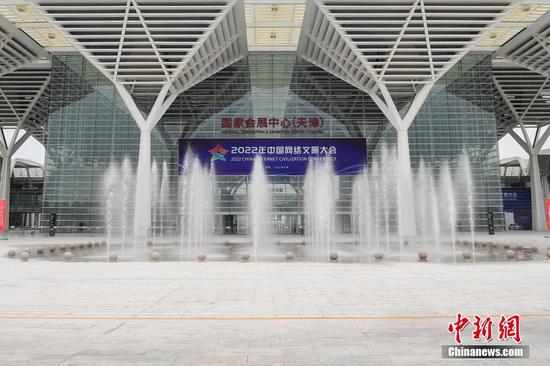China's approach to cyberspace governance

2022 China Internet Civilization Conference kicked off in north China's Tianjin, Aug. 28, 2022. (Photo/China News Service)
(ECNS) -- With the digital age having a profound impact on human society, China has put forward "Chinese solutions" for the international cyber governance system, demonstrated by its efforts in maintaining cyber security, developing global internet infrastructure and building an internet governance system, etc.
As early as December 2015, Chinese President Xi Jinping proposed that the international community should work together to foster a peaceful, secure, open and cooperative cyberspace and put in place a multilateral, democratic and transparent global Internet governance system.
Maintaining cyber security
Xi put forward that China would provide more and better online content and put in place a system for integrated internet management to ensure a clean cyberspace during his report at the 19th CPC National Congress in 2017.
He highlighted the necessity for a cyberspace environment that is safe and manageable as well as open and innovative in an instruction to a week-long national awareness campaign on cybersecurity in 2019.
Safeguarding cybersecurity is of great importance to the healthy development of China's digital economy. Thus, Chinese authorities have made increasing efforts to maintain domestic cybersecurity.
According to the three-year (2021-23) draft plan for the cybersecurity sector released by China’s Ministry of Industry and Information Technology (MIIT) in July 2021, the scale of the cybersecurity industry is expected to exceed 250 billion yuan ($38.62 billion) by 2023, with a compound annual growth rate of over 15 percent.
Besides, China has actively joined international efforts to safeguard international cybersecurity.
The country will explore norms of behavior and concrete measures for international cooperation against cyber terrorism, including discussion on an international convention on combating cyber terrorism and consensus building on fighting cybercrimes and cyber terrorism, according to its International Strategy of Cooperation on Cyberspace released in 2017.
China further encourages all parties to commit to peaceful settlement of disputes, non-use or threat of force and other basic norms in international relations and put in place consultation and mediation mechanisms to forestall and avoid conflict, so that cyberspace will not become a new battlefield.
Developing global Internet infrastructure
The essence of the Internet is connectivity, and herein lies the value of information. Only by strengthening the building of internet infrastructure can we narrow the digital divide between different countries, regions and communities and ensure full flow of information resources, Xi said at the Second World Internet Conference in 2015.
Over the past decade, China has built the world's largest network infrastructure with advanced technology, Xin Guobin, vice minister of industry and information technology, announced in June this year.
Besides, access bandwidth of the optical fiber network has increased from 10 Mbps to 1000 Mbps, mobile networks have made breakthroughs in 3G, 4G and 5G, and broadband access has been extended to all administrative villages across the country, contributing to poverty alleviation.
At the same time, China has been committed to sharing its digital dividends with the rest of the world. The country has continuously aided less developed nations in the forms of technology, equipment and services. In recent years, China's digital trade with Belt and Road countries has maintained strong growth.
China also supports Africa in building new types of infrastructure and developing the digital economy to bridge the digital divide, which was highlighted in the China-Africa Cooperation Vision 2035 released at the 8th Ministerial Conference of the Forum on China-Africa Cooperation in 2021.
Building a global Internet governance system
Cyberspace concerns the future of humanity, and the future of cyberspace should be jointly ensured by all countries, Xi stressed in a congratulatory letter to the World Internet Conference for the inauguration of the international organization in July 2022.
China has further participated in multilateral activities concerning global cyberspace governance through various platforms, covering the Internet Governance Forum, World Summit on the Information Society, World Economic Forum, and more.
Moreover, the country established the International Research Center of Big Data for Sustainable Development Goals (SDGs) in Beijing in September 2021, which will establish a global monitoring and evaluation system for SDGs, providing relevant UN agencies and member states with data sharing, technological assistance and decision-making support.
There is no doubt that China will continue contributing to global cyberspace governance. Actively participating in the formulation of international rules and technical standards on data security, digital currency and data tax has been written into the 14th Five-Year Plan, the country's development blueprint.

